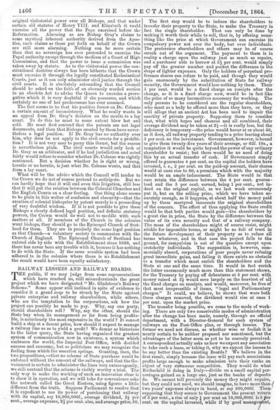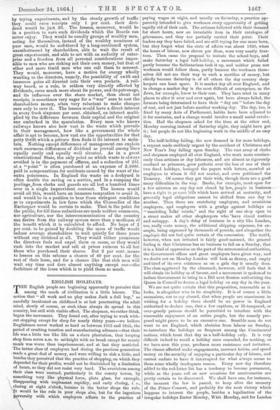RAILWAY LESSEES AND RAILWAY BOARDS. T HE public if we may
judge from some representations which have reached us, still misunderstands the great project which we have designated "Mr. Gladstone's Railway Scheme." Some appear still inclined in spite of evidence to consider it a grand coup to be struck by the State against private enterprise and railway shareholders, while others, who see the temptation to the corporations, ask how the project can possibly be made to pay. Why, say one party, should shareholders sell ? Why, say the other, should the State buy when its management so far from being profita- ble, is notoriously the most expensive in the world ? It cannot build a ship at a decent price, how should it expect to manage a railway line so as to yield a profit? We demur as historians to the latter query, the State having organized the greatest system of communication now in existence, a system which embraces the world, the Imperial Post-Office, with decided success and economy, but as politicians we may recognize the feeling from which the assertion springs. Granting, then, the two propositions,—that no scheme of State purchase could be enforced without the consent of the railways, and that the Go- vernment is certain to administer the lines very extravagantly, we still contend that the scheme is visibly worthy a trial. The only way to make the working of such an innovation clear is to show it in operation, and we will take for convenience sake the network called the Great Eastern, using figures a little different from the truth. Suppose Parliament to resolve that it is expedient to use its power of purchasing that railway with its capital, say 10,000,0001., average dividend, 21 per cent., average expenses, 21 per cent. also, and average price, 50. The first step would be to induce the shareholders to transfer their property to the State, to make the Treasury in fact the single shareholder. That can only be done by making it worth their while to sell, that is, by offering some- thing like the price at which Government can exercise its compulsory power not over the body, but over individuals. The preference shareholders and others may be of course struck out of the argument. The payment to them is in reality a charge upon the railway just as much as repairs, and a purchaser able to borrow at 3i per cent. would simply pay off the greater number and pocket the difference in the shape of lighter expenses. Only the holders of perpetual pre- ference shares can refuse to be paid, and though they would gain enormously by the substitution of State for railway security, the Government would lose nothing by them. Their 5 per cent. would be a fixed charge on receipts after the change, as it is a fixed charge now, would be in fact like the price of so many locomotives necessary for working. The only persons to be considered are the regular shareholders, who must as a body be offered more than they have, or they will allege that an ancient Act has been used to impair the sanctity of private property. Supposing them to consider that, what with hopes and chances and all combined, their average dividend may be taken at 2i—it is really less, but the deficiency is temporary—the price would hover at or about 50, as it does, all railway property tending to a price leaving about 5 per cent. on the investment. Government, however, is bound to give them twenty-five years of their average, or 621. 108., a temptation it would be quite beyond the power of any ordinary shareholder to resist; but there would be no need of doing this by an actual transfer of cash. If Government simply offered to guarantee 4 per cent. on the capital the holders have invested, i. e., 2 per cent. on the paid-up amount, their shares would at once rise to 60, a premium which with the majority would be an ample inducement. The State would in that case retain the difference between the 4 per cent. guaran- teed and the 5 per cent. earned, being 1 per cent., not in- deed on the original capital, as we last week erroneously put it, but on the selling price, which we have taken ac- curately enough, as it happens, at about half the money paid up by those martyred innocents the original shareholders of the concern. The effect of thus applying the State credit would be that both parties would gam—the shareholders by a great rise in price, the State by the difference between the value of its own security and that of a railway company. The mass of the shareholders might of course resist, might stickle for impossible terms, or might be so full of trust in the future development of their property as to refuse all terms whatever, and in that case the project falls to the ground, for compulsion is out of the question except upon crotchetty individuals. The supposition is, however, com- mercially absurd, corporations of poor people never refusing great immediate gains, and failing it there exists no obstacle to a transfer which must enrich the shareholders and the State at one and the same time. It would in fact enrich the latter enormously much more than this statement shows for the Treasury by paying off debentures at 5 per cent, witl: money raised at 31 would save largely on the heaviest of all the fixed charges on receipts, and would, moreover, be free of that most irrepressible of items, "legal and Parliamentary charges." It could, we believe, be shown that were both these charges removed, the dividend would rise at once 1 per cent. upon the market price. The trawler being possible, we come to the mode of work- ing. There are only two conceivable modes of administration after the change has been made, namely, through an official department, with a Director-General for each system of railways on the Post-Office plan, or through lessees. The former we need not discuss, as whether wise or foolish it is nearly certain to be neither proposed nor sanctioned, but the advantages of the latter seem as yet to be scarcely perceived. A correspondent actually asks us how we expect any association to take such a lease, or taking it, why we expect the lessees to be any better than the existing Boards? We believe in the first result, simply because the lease will pay such associations profits large enough to make admission into their ranks an object of very strenuous competition. They would do what Rothschild is doing in Italy—divide on a small capital per- centages gained on a large one, just as the banks of deposits do. We cannot tell precisely the money they might require, but they could not need, we should imagine, to have more than,/ two years' expenses always in hand, or say 500,000/. Them supposing that they secure to Government the present return t of 5 per cent., a rise of only } per cent on 10,000,000/. is 5pl er cent. on the capital invested, while if by good manage nt, by trying experiments, and by the steady growth of traffic they could raise receipts only 1 per cent. their divi- dend would be just 20. The lessees, moreover, would be in a position to earn such dividends which the Boards can never enjoy. They would be usually groups of wealthy men, acting for themselves, instead of the wealthy nominees of poor men, would be unfettered by a long-continued system, unembarrassed by shareholders, able to wait the result of great experiments, and able to act with an audacity of enter- prise and a freedom from all personal considerations impos- sible to men who are risking not their own money, but that of other and more timid men who can call them to account. They would, moreover, have a motive for energy wholly wanting to the directors, namely, the possibility of swift and immense gains all directed into their own pockets. A rail- way board, as a rule, is seldom very directly affected by dividends, cares much more about its power, and its patronage, and its influence over the share market, than about net receipts, is sometimes very eager for a "war" sure to cost the shareholders money, often very reluctant to make changes sure only to save it. The lessees would have a direct interest in every fresh sixpence per cent. obtained, an interest multi- plied by the difference between their capital and the original one embarked in the speculation. Every man who knows railways knows also how vast is the waste which prevails in their management, how like a government the whole affair is apt to become, how vast are the opportunities for that petty thrift which a private firm finds it its interest to main- tain. Nothing except differences of management can explain sueh enormous differences of dividend as prevail among lines equally costly and equally well situated. As in a great constitutional State, the only point on which waste is always avoided is in the payment of officers, and a reduction of 251. at a " point " is often purchased at an expense of 2,500/. paid in compensations for accidents caused by the want of the extra pointsman. In England the waste on a dockyard is often double the saving on a service, and in a company the peelings.frora clerks and guards are all lost a hundred times over in a single improvident contract. The lessees would avoid all this, would have an immense temptation to avoid it, and would be in a position to bear those stringent conditions as to experiments in low fares which the Chancellor of the Exchequer would be certain to make. That is the point for the public, for till these reductions are made neither commerce, nor agriculture, nor the intercommunication of the country can derive from the railway system more than a modicem of the benefit which it is calculated to afford. No hope of 2 per cent. to be gained by doubling the mass of traffic would induce average shareholders to wait quietly for three years without any dividend at all. They would either pronounce the directors fools and expel them en mane, or they would rush into the market and sell at prices ruinous to all but those who purchased their shares. But 2 per cent, means to lessees on this scheme a chance of 40 per cent. for the rest of their lease, and for a chance like that rich men will wait any time and dare almost anything except one—the forfeiture of the lease which is to yield them so much.































 Previous page
Previous page